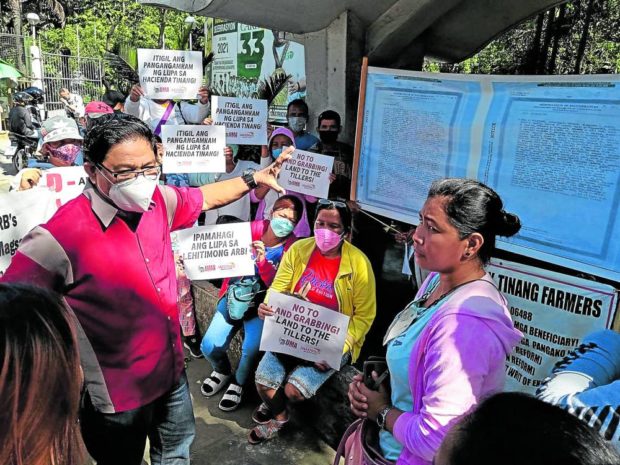
DEMAND Former Agrarian Reform Secretary Rafael Mariano joins agrarian reform beneficiaries who trooped to the Department of Agrarian Reform office in Quezon City on Thursday to demand titles to lands at Barangay Tinang in Concepcion, Tarlac. —PHOTO COURTESY OF UNYON NG MGA MANGGAGAWA SA AGRIKULTURA
CITY OF SAN FERNANDO—Tension rose again over a 200-hectare land in Concepcion town, Tarlac province, that is being disputed for 34 years by agrarian reform beneficiaries (ARBs) and a cooperative handled by Tarlac Rep. Noel Villanueva and his brother Vernon, a board member.
On Thursday, the ARBs staged a protest at the Department of Agrarian Reform (DAR) central office in Quezon City after filing a comment to the petition of Tinang Samahang Nayon Multi-Purpose Cooperative to revise the certificate of land ownership award (Cloa) issued in 1995.
At least 94 of the 236 ARBs signed the comment, saying the DAR had identified them on the final list in 1995, or seven years after the land was covered by the Comprehensive Agrarian Reform Program (CARP) in 1988.
‘Error-ridden’
The Catholic Church’s Dominican order sold the property to the government for the CARP, a part of the comment read.
The ARBs claimed that they were unaware that Cloa No. 00313421, through Transfer Certificate Title No. 06488-A, was issued to them on Sept. 26, 1995.
In a Viber message on Thursday, Representative Villanueva referred the Inquirer to his letter to Agrarian Reform Undersecretary Luis Meinrado Pangulayan in August 2021, pointing out that the listing and process were fraught with “errors.”
“Some of those listed in the collective Cloa title were not even qualified, while those qualified were not included,” Villanueva said in the letter.
In a referendum by the DAR in 1999, the 94 ARBs voted “no” to join the cooperative and to have the lands managed by it.
According to them, the DAR attempted to segregate the lands for those who voted no.
“Due to the influence of the Villanueva family, the segregation of the land did not materialize,” they said. In 2018, they asked the DAR to subdivide the land and issue them individual titles.
Villanueva said the second screening surfaced issues like duplication of names, use of aliases, exclusion of Dominican employees, and inclusion of nonresidents, private contractors and minors, leading to 468 ARBs.
Process incomplete
At least 90—36 of them listed on the Cloa—opted to separate from the cooperative, preferring to get a share of 50 ha.
“The DAR initiated the process of correcting the said collective Cloa but was left incomplete and still subject [to] implementation,” Villanueva wrote.
He added: “Instead of acting on the revocation/revision of the Cloa title and pursuing the inclusion-exclusion process in order to attain such correction, [the] DAR opted to prematurely grant the request of the 90 ARBs [54 of which were not even included in the collective Cloa title] to subdivide and have individual Cloas issued, thereby undermining the proper procedure.”
The ARBs alleged that then Tinang village chief Vernon “concealed the fact of the issuance of the Cloa.” They said eight members of the Villanueva family held a total of 2,680 shares in the cooperative.
According to Villanueva, he and his immediate relatives became founding members of the cooperative because farmers in their home village of Tinang asked them to help organize it as early as 1980.
When the ARBs increased to 468 after the second screening, the cooperative was asked to manage the land for fear they would get smaller plots of land.
The 90 ARBs did not join the cooperative and did not agree that the cooperative would manage the land. They asked for a share of 50 ha.
Villanueva said these beneficiaries had already sold their lands.